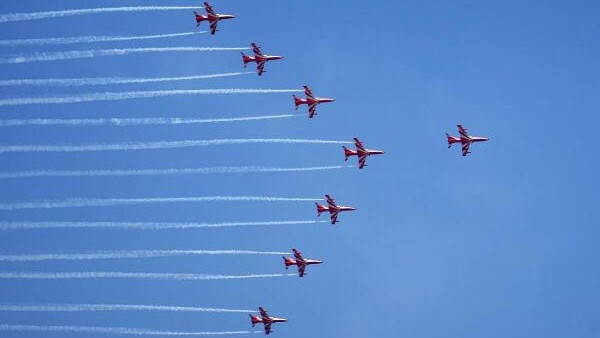
Indian Air Force (IAF) Suryakiran aerobatic team performs during the "Aero India 2025" air show at Yelahanka air base in Bengaluru.
Credit: Reuters Photo
Bengaluru: While the Defence Research and Development Organisation (DRDO) propounded "India as a one stop solution" for defence and aerospace needs (one of the themes of Aero India 2025, that was flagged off on Monday) not many stakeholders in the sector are convinced that it will pan out as planned.
Both domestic and international players, DH spoke to, on the sidelines of the first day’s proceedings, expressed reservation about the country’s ability to emerge as a defence manufacturing hub.
Since a lot of indigenous technology is not war-proven, it is imperative to have collaborations with foreign vendors, according to Addepalli Krishna Sai Kumar, Whole-Time Director (Operations) of Apollo Micro Systems Limited.
A representative of another domestic company, on the condition of anonymity, said that while 40-60 per cent of manufacturing can be done in India, doing more is currently not practical.
Many of the key components, technologies and raw materials have to be imported from abroad, he pointed out. “Even considering what little is available in India, smaller companies are not able to access this as it is the bigger players who monopolise this,” he added.
An Australian company spokesperson, asking not to be named, said the Make In India push by the government could be counter-productive, as many foreign arms manufacturers don’t want to compromise on the security of their intellectual property (IP) by manufacturing locally.
He explained, “With the huge investments we make in our IP, we would prefer selling in India so we can load it ourselves.” This makes it harder for such companies to penetrate the Indian market altogether, according to him. “To put it bluntly, India is one generation behind,” he said.
Despite the many challenges though, investing sentiment was strong at the event.
Spokespersons at the UK-India pavilion said that it was an epochal opportunity to invest in India. Apollo’s Kumar was confident about the sustained future of the market.
“There is increasing interest from foreign companies, but it is dominantly as joint ventures (JVs) wherein they can tap the Indian market and manufacture with their own tech. To protect their IP, several companies are masking their tech in different ways,” said Hardik Doshi, Manager (Growth), Star Hentzen Coatings Pvt Ltd.
Several JVs and partnerships between foreign and Indian companies are operating in the field, of which many have come up in recent years.
Boeing and Tata’s JV in aerospace manufacturing was launched in 2015. The GE Aerospace and Hindustan Aeronautics Limited (HAL) partnership expanded in 2023 to produce fighter jet engines for the Indian Air Force. Bharat Electronics Limited (BEL) and Israel Aerospace Industries (IAI) established a JV in 2024 to extend long-term support to the Medium Range Surface-to-Air Missile (MRSAM) systems of India's defence forces. Several more have been operating and are in use in India’s defence industry.